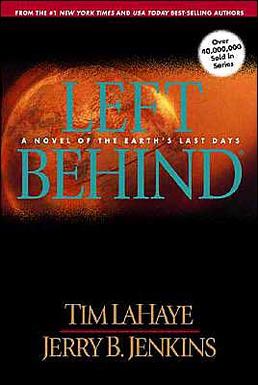Left Behind, pg. 45
Rayford Steele and LaHaye & Jenkins are moving along and so must we.
Finally in the terminal, Rayford found crowds standing in lines behind banks of phones. Most had angry people waiting, yelling at callers who shrugged and redialed.
Left Behind was written in 1995, before cell phones had reached the tipping point and become indispensable and omnipresent. Much of the book therefore is occupied with the now anachronistic-seeming logistics of pay phones and pre-cell communications. We’ve already explored this a bit in discussing Buck Williams’ dubious splicing of a dial-up modem and an airphone.
 This is a reminder of how much our communications world has changed in just the last nine years. It’s also a reminder, as Patrick Nielsen Hayden noted in comments, that writing about the immediate future is difficult. I’m willing to give L&J credit for degree of difficulty here — anticipating short-term technological changes is tricky. But you’d think they’d have gotten something right.
This is a reminder of how much our communications world has changed in just the last nine years. It’s also a reminder, as Patrick Nielsen Hayden noted in comments, that writing about the immediate future is difficult. I’m willing to give L&J credit for degree of difficulty here — anticipating short-term technological changes is tricky. But you’d think they’d have gotten something right.
Airport snack bars and restaurants were already sold out or low on food, and all newspapers and magazines were gone. In shops where staffers had disappeared, looters walked off with merchandise.
What can explain this strange run on “newspapers and magazines”? Millions of people around the world have just disappeared. Actually, since all the children have disappeared, that would be billions of people. In the wake of such an event people would presumably be desperate for news. The morning editions of the Sun-Times and the Tribune would be full of yesterday’s news — events that would seem horribly trivial and out-of-date in the light of the tragedy that has just unfolded.
L&J haven’t given us a clear idea of what time of day it is in Chicago (or what time of year it is, for that matter), but it seems unlikely that the papers would have managed — between whenever the disappearances occurred and whenever it is that Rayford arrives at the terminal — to produce and distribute afternoon extras in time for anything newsworthy to be in the racks at the airport newstands. Time, Newsweek and “Global Weekly” would be even more irrelevant with their stale summaries of the previous week’s news.
As for the rest of the magazines — the entertainment and style and sports glossies that make up the bulk of an airport newstand — I can’t begin to imagine what would prompt someone to think, “Oh the humanity! I’d better get me a copy of Elle.” (And since airport newsstands also reserve several feet of shelf-space for porn, the now-empty racks might suggest that O’Hare’s mens rooms would be a very unpleasant place.)
The looting of other shops is similarly strange. I can understand people walking off with, say, the candy section because, hey, free Snickers. But why would people facing a serious apocalyptic calamity bother to walk off with an armful of Sears Tower snow-globes?
The preoccupation with pay phones seems anachronistic to us now because L&J failed to anticipate the cell phone revolution. But the biggest reason that the beginning of Left Behind seems dated and unreal has nothing to do with technological change.
The early chapters of the book are all about people responding in the aftermath of a world-shifting tragic event. We have since learned what such an event feels like. We saw how people responded, what became important and what was set aside.
And it wasn’t like this. These early chapters aren’t just technologically dated, they also seem a bit September 10.
Left Behind, pp. 45-46
Untold millions are still untold
Untold millions are outside the fold
Who will tell them of Jesus’ love
And the heav’nly mansions awaiting above?
So our man Rayford Steele has finished his “emergency duty,” which consisted of walking to the terminal of O’Hare airport instead of accepting a ride. Confronted with the chaos and carnage of multiple plane crashes, a lesser man — a Bernie Laplante — might have panicked and done something foolish, but not Steele. He surveyed the scene and his professional training kicked in. His duty was clear: he walked the other way.
Now, safely back at the terminal, “Rayford wanted more than anything to sit and talk with someone about what to make of this.”
Apparently, Hattie doesn’t count. The two of them just walked more than two miles together. Despite their long acquaintance — “They had spent time together, chatting for hours over drinks or dinner” — she’s still just a pretty girl and not really “someone” worth talking to.
In the terminal, “Everyone scurried about, trying to find some link to the outside world, to contact their families, and to get out of the airport.”
The cell-phoneless Rayford and Hattie join in the scurrying, splitting up to try to call their families.
Here again we see the storytelling mastery of Jerry Jenkins. He knows that what readers are longing for now is another passage on the logistics of telecommunications. And he delivers.
Steele makes his way to a pilot’s lounge where a “supervisor” alerts them that some special phone lines have been reserved, just for pilots. Steele gets in line with the privileged few.
Here LaHaye and Jenkins had me worried. Steele seemed to be in real peril. According to the morality governing the world of Left Behind, accepting special privileges because of your status as a pilot is a grievous sin.
Hadn’t Steele just chewed out his copilot Smith for just such behavior? Smith accepted a ride back to the terminal, but Steele had refused — even despite the airline’s insistence. Yet now, with an airport full of people desperate to make phone calls, Steele happily jumps at the chance to use a special phone line and to “bypass the normal trunk lines out of here, so you won’t be competing with all of the pay phones in the terminal.”
But then I realized the difference between Smith’s actions and Steele’s. Smith accepted a ride in public. (“How would that look?” Steele had said.) But no one would know that Steele was bypassing the other callers on a privileged, pilots-only line. In the world of LB, it’s okay to use your privilege to get ahead as long as no one sees you do it.
Rayford got in line, beginning to feel the tension of having flown too long and known too little. Worse was the knowledge that he had a better idea than most of what had happened. If he was right, if it were true, he would not be getting an answer when he dialed home.
Here I caught a first whiff of what it is that really separates the Left Behind novels from most of the evangelical genre fiction that had gone before.
Evangelical Christianity, at its core, is radically inclusive. Evangelicals, born-againers, want everybody else to become born-again too.
Granted, this inclusivity isn’t always expressed in the most winsome or persuasive manner, but it’s the heart and soul of evangelicalism. As the Sunday school chorus quoted above shows, the goal of evangelicals has traditionally been to reach out to the lost, to the “untold millions” of the unsaved.
Most evangelical fiction has conveyed this evangelistic impulse — albeit with the unfortunate awkwardness and fecklessness that characterizes too much of their evangelism. But that’s not what one finds in Left Behind. Here you find little concern — and even less of a sense of responsibility — for the plight of the untold millions. What one finds instead is a sense of triumphalism. Those “inside the fold” feel no sense of obligation to those on the outside — they are bad people who are getting what they deserve and the godly remnant gets to watch, more in delight than in sadness. This is a major theme of the book.
Rayford realizes that he “had a better idea than most of what had happened,” yet he feels little obligation to share this news. At this point in the story Rayford is not yet a Christian himself, but his outlook doesn’t change greatly even after he becomes one. In Left Behind the gospel is not the good news of salvation to be shared with the untold millions. It is a secret to be treasured, hoarded and hidden under a bushel by the chosen few.
And what about those untold millions? They can go to Hell.













